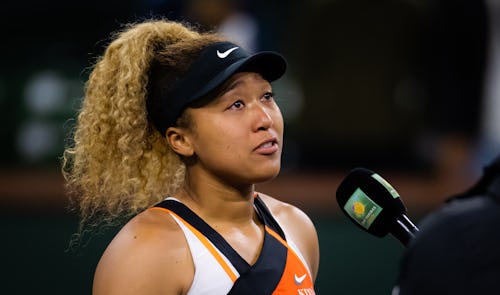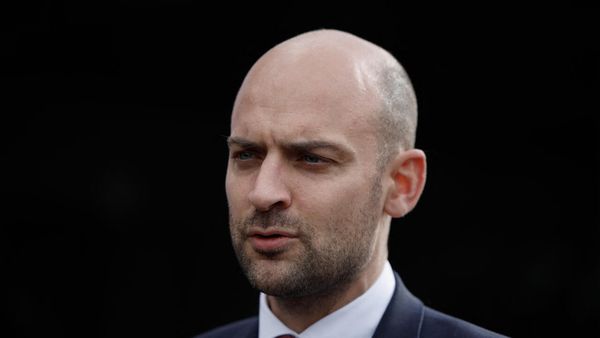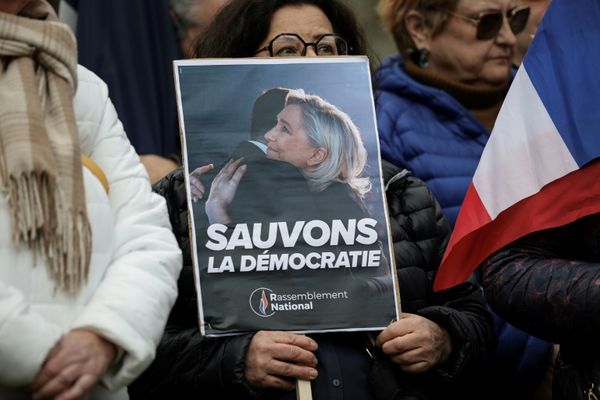
There is a way that racism reverberates.
On Saturday, Naomi Osaka’s beautiful mind — her most hallowed space — became something of an echo chamber, in the traditional sense. The words, “Naomi, you suck!”, bounced off the walls in her mind as if on replay. They were widely described as “heckling” from a woman in the crowd during Osaka’s match against Veronika Kudermetova at the Indian Wells Masters tennis tournament — but the history of the tournament suggests this was more than mild harassment. This was cultural.
Osaka, a historian in her own right, understood this.
“To be honest, I’ve gotten heckled before, it didn’t really bother me,” she said in a post-match interview on the court. “But (being) heckled here, I watched a video of Venus and Serena getting heckled here, and if you’ve never watched it, you should watch it. I don’t know why, but it went into my head, and it got replayed a lot.”
The on-court interviewer, who told Osaka “we love you here,” certainly didn’t mean any harm following the star athlete’s defeat and tearful address. But his comment directly preceding that one was nonetheless problematic. “On behalf of everybody here, out of about 10,000 people, one person’s voice can’t weigh out 9,999 others.”
One of the reasons America is stuck in a perpetual cycle of racism is because it relies on the oppressed to do the corrective work that should be done by the oppressors. Osaka has done the healing work, in the midst of public spectacle, no less.
But it’s the Indian Wells tournament organizers who need to get their act together; instead, they’ve looked the other way for more than 20 years. They had the opportunity for meaningful change as early as 2001, when spectators angrily booed and berated a Black father and his children — Serena and Venus Williams — because of unfounded allegations that their father, Richard, fixed matches. Or, as British commentator Simon Reed put it: “It’s an amazing sound here, a crescendo of boos for Serena Williams. …And the crowd, an American crowd, booing an American family, and you have to say, that it does smack of a little bit of racism.”
In moments like these, we clearly see the illusion of decorum in “high-brow” sports like tennis and golf. While it’s understood that sports like football, basketball, and hockey can be raucous — both in the stands and between the lines — tennis and golf are different. In these sports, which have elitist origins and severely lack diversity, players and fans alike are expected to conduct themselves with grace.
And yet, that so-called “grace” is rarely given to Black athletes — like Osaka, the Williams sisters, and Tiger Woods.
A 14-year-old Tiger drew a link between how he was treated at golf clubs and how it might tie into the history of slavery in a prescient 1990 interview. Serena, meanwhile, has endured attacks on her femininity for years, both among Twitter trolls and controversial cartoonists alike.
On that day back in 2001, then 19-year-old Serena Williams dug deep and secured her second major win. But the scars dug deeper, as Williams explained in a 2015 column for Time Magazine, 14 years after she and her family boycotted Indian Wells. Did the Indian Wells officials and patrons make things right in the aftermath of that ugly scene? Of course not. Serena had to do the work herself. “Throughout my whole career, integrity has been everything to me. It is also everything and more to Venus,” she wrote. “The false allegations that our matches were fixed hurt, cut and ripped into us deeply. The undercurrent of racism was painful, confusing and unfair.”
She continued, “This haunted me for a long time. It haunted Venus and our family as well. But most of all, it angered and saddened my father. He dedicated his whole life to prepping us for this incredible journey, and there he had to sit and watch his daughter being taunted, sparking cold memories of his experiences growing up in the South.”
Racism reverberates.
* * *
Indian Wells’s mistreatment of indigenous people isn’t reserved for Black female tennis players. The name of the tournament — which is also the name of the city it’s in — suggests that. Indian Wells, part of the greater Palm Springs area, got its name from a water source hand-dug and maintained by the indigenous Cahuilla tribe. The aptly-named “Agua Caliente” Band of Indians built the well in the mid-1800s, but the area’s landscape quickly changed in the years ahead due to the discovery of gold. What whitewashed history calls the “gold rush,” indigenous descendants call genocide. Through the combination of white violence and legislation, California’s Native American population of 150,000 was cut down to only 30,000. In 1853, a government mapping survey identified the hot springs mineral pool in the area now known as Palm Springs. Ten years later, the discovery of gold brought settlers — and smallpox. Even before the Dawes Act of 1887 decimated Native American lands and cultures through the land-grabbing process known as “checkerboarding,” many tribes had already been placed on reservations through forced assimilation.
In one sense, that on-court interviewer speaking to Osaka last weekend was right: one voice in the midst of 10,000 doesn’t hold the power. But the system that empowers that voice does. That clamoring grows louder every day, with new pieces of legislation aimed at suppressing the ugly parts of American history and slashing the rights of indigenous people. Indian Wells, both the city and the tournament itself, has a problem, and it’s symptomatic of a bigger issue — America’s refusal to repair the wrongs done to its indigenous people. It’s why predominately white crowds screaming obscenities at and flagrantly disrespecting Black athletes in the name of “heckling” will never sit right with me. It’s nationalism, pure and simple, and sports jerseys only serve as wrapping paper to that hateful culture.
Being a Black athlete in America feels like you’re always playing a road game on home soil. And what’s even more painful is the fact that the boos and the jeers from the crowd pale in comparison to the blood, sweat, and tears of your people that saturate said soil.







